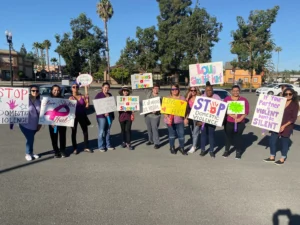La falta de vivienda es un problema social complejo en el sentido de que no hay un problema de fondo que pueda señalarse y decir por qué la gente vive en la calle. La realidad es que hay muchas razones, incluidas situaciones desafortunadas como la pérdida del trabajo, una relación abusiva o problemas de salud mental. Una cosa que he aprendido es que nunca se conoce la historia de alguien hasta que se le escucha de verdad.
Como trabajador de divulgación de Crisis House, mi objetivo es trabajar como un puente para conectar a las personas con los servicios que necesitan con el fin último de obtener una vivienda. Pequeñas cosas como llevar a un cliente al DMV para obtener su identificación es un éxito que ayuda a las personas a alcanzar sus objetivos. Al mantener conversaciones centradas en las soluciones, somos capaces de capacitar a las personas para que formen parte del proceso de cambio por sí mismas.
Una cosa que he observado en mi trabajo es que la gente forma comunidades en la calle. El cuerpo humano es asombroso y trabaja para permanecer en homeostasis, es decir, adaptándose a nuestro entorno. Así, las personas sin hogar se adaptan a la vida al aire libre, lo que dificulta la transición a la vida en el interior. Esta es una realidad interesante que aprendí en una formación que me hizo reflexionar sobre los pequeños retos a los que se enfrenta la gente y en los que uno no pensaría normalmente.
Hemos tenido éxito en ayudar a la gente a pasar de vivir en la calle a tener una vivienda, pero lo que hemos aprendido es que la mayoría de las veces, es un proceso que no ocurre de la noche a la mañana. Por ejemplo, un hombre que conocí en uno de los desayunos del sábado en Vista La Mesa Christian Church un par de meses será alojado dentro de las próximas dos semanas a través de nuestro programa de realojamiento rápido. Este caballero de 63 años ha estado experimentando la falta de vivienda desde 2012 y se enfrenta a varios problemas de salud. Simplemente escuchando su historia en el evento de desayuno, yo era capaz de construir una relación con él, por lo que es más fácil para presentarlo a Joe, nuestro navegador de vivienda para el programa HEAP. Éxitos como este son los que dan esperanza a la ardua pero significativa labor que realizamos a diario.







